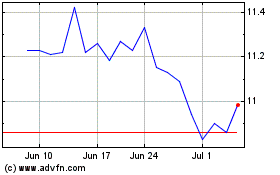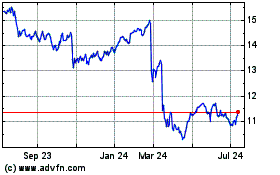By Catherine Lucey and Stephanie Armour
WASHINGTON -- Health experts and a company that makes cleaning
products issued warnings to Americans on Friday, after President
Trump speculated that using disinfectants or solar light inside the
body could be an effective coronavirus treatment, comments that he
later walked back.
Reckitt Benckiser, the maker of the Lysol line of household
disinfectant products, wrote on Friday that it was compelled to
issue a statement "due to recent speculation and social-media
activity" and warned against the improper use of its products: "We
must be clear that under no circumstance should our disinfectant
products be administered into the human body."
During his coronavirus briefing Thursday night, Mr. Trump
pondered whether treatments involving light or disinfectants should
be studied.
"So, supposing we hit the body with a tremendous -- whether it's
ultraviolet or just very powerful light -- and I think you said
that that hasn't been checked, but you're going to test it," he
said. "And then I said, supposing you brought the light inside the
body."
Mr. Trump added: "And then I see the disinfectant, where it
knocks it out in a minute. One minute. And is there a way we can do
something like that, by injection inside or almost a cleaning.
Because you see it gets in the lungs and it does a tremendous
number on the lungs."
Dr. Deborah Birx, the administration's coronavirus response
coordinator, watched quietly with an impassive expression on her
face as the president spoke. At one point, Mr. Trump asked her if
she had heard that heat and light could work as a treatment for the
virus. She replied: "Not as a treatment, no."
She added: "Certainly fever is a good thing. When you have a
fever, it helps your body respond."
After Mr. Trump's comments drew widespread criticism, he sought
to dismiss his remarks, telling reporters Friday afternoon: "I was
asking a question sarcastically to reporters like you just to see
what would happen."
He said that he wanted experts to "look into whether or not sun
-- and disinfectant on the hands -- but whether or not sun can help
us." The virus, he said, "doesn't live well with heat and sun and
disinfectant. And that's what I brought up, and I thought that was
clear."
Surgeon General Jerome Adams, a member of the coronavirus task
force, tweeted a reminder for Americans to "PLEASE always talk to
your health provider first before administering any
treatment/medication to yourself or a loved one," and quoted a
White House statement saying that Mr. Trump has warned Americans to
get advice from their doctor.
The state of Maryland tweeted a warning about not ingesting or
injecting disinfectants, with a spokesman for Republican Gov. Larry
Hogan saying its hotline had received more than 100 calls about the
matter.
Public health experts were alarmed by Mr. Trump's comments.
Leana Wen, former Baltimore health commissioner and an emergency
doctor at George Washington University Hospital, said that
"injecting people with disinfectant is harmful and could be deadly.
It has no benefit whatsoever, and could permanently damage blood
vessels and tissue, and even kill."
Dr. Arthur Caplan, a professor of medical ethics at New York
University's Grossman School of Medicine, said it was dangerous for
the president to speak off the cuff about unproven treatments.
"People listen to him, they then go out and try things," Dr.
Caplan said. "You're going to kill people when you suggest try
antimalarial drugs or try disinfectants or other unproven or
dangerous ideas."
This wasn't the first time the president has spoken about
possible treatments for the new coronavirus, which has killed more
than 50,000 people in the U.S. He previously encouraged people to
take a combination of antimalarial and antibacterial drugs to
combat it, defying the advice of public-health experts as his own
advisers debate the effectiveness and safety of the drugs.
The Food and Drug Administration warned Friday that two drugs
touted by Mr. Trump -- hydroxychloroquine and chloroquine -- are
linked to cardiac dangers and should only be used in hospitalized
patients or as part of clinical trials for the virus.
Mr. Trump made his controversial remarks Thursday in a briefing
that earlier included remarks of sunlight's effect on the virus.
William Bryan, the science and technology adviser with the
Department of Homeland Security, told reporters that it takes 90
seconds for the virus to lose half its strength in the presence of
sunlight.
Other research has found the virus can survive for days on some
surfaces, such as cardboard, and is detectable in the air for up to
three hours, according to a study in the New England Journal of
Medicine. Additional studies have also indicated that ultraviolet
light appears to destroy the virus.
Sunlight and humidity have both been found to make it harder for
the novel coronavirus to survive on hard surfaces. Currently,
scientists don't know if spread of the novel coronavirus will wane
in summer. An April study in the National Academies of Sciences,
Engineering and Medicine indicated that heat and humidity may not
be sufficient to significantly slow the virus.
Write to Catherine Lucey at catherine.lucey@wsj.com and
Stephanie Armour at stephanie.armour@wsj.com
(END) Dow Jones Newswires
April 24, 2020 15:29 ET (19:29 GMT)
Copyright (c) 2020 Dow Jones & Company, Inc.
Reckitt Benckiser (PK) (USOTC:RBGLY)
Historical Stock Chart
From Mar 2024 to Apr 2024

Reckitt Benckiser (PK) (USOTC:RBGLY)
Historical Stock Chart
From Apr 2023 to Apr 2024
